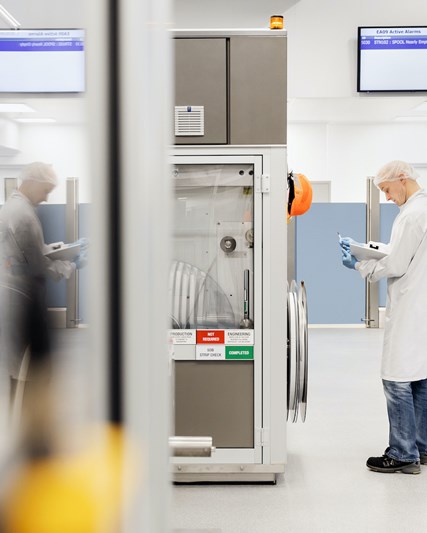Issued: London, UK
For media and investors only
GSK announces major step towards sustainability ambitions with advancement of low carbon Ventolin programme to Phase III trials
- Next-generation propellant technology has the potential to reduce greenhouse gas emissions from Ventolin (salbutamol) inhaler by approximately 90%
- Current propellant accounts for 49% of GSK’s carbon footprint
- The inhaler is currently prescribed to approximately 35 million patients
- Successful phase III trials to support regulatory submissions in 2025
GSK plc (LSE/NYSE: GSK) today announced it will start Phase III trials of a low carbon version of its metered dose inhaler (MDI), Ventolin (salbutamol), using a next generation propellant, in 2024. If successful, it has the potential to reduce greenhouse gas emissions from use of the inhaler by approximately 90%, significantly contributing to GSK’s ambitious net-zero climate targets.
Thirty-five million patients with respiratory conditions around the world rely on this inhaler as their rescue medication. However, it accounts for close to half (49%) of GSK’s carbon footprint, as well as contributing to the carbon footprint of global health systems. Significantly reducing the carbon footprint of the propellant in the inhaler is a key milestone in the company’s pathway to net zero.
GSK is investing in a R&D programme to redevelop the inhaler by transitioning to a lower carbon propellant. The next-generation propellant, which has been under technical development for several years, has been tested extensively to ensure suitability for MDIs and patient use. Recent data from early clinical trials has supported the decision to progress to phase III and dosing of first patients is planned in the first half of 2024. If successful, regulatory submissions will begin in 2025.
GSK Chief Executive Officer, Emma Walmsley, said: “As countries work to decarbonise their health systems, companies have an important role to play – and addressing the carbon emissions from inhalers is a key part of this. Harnessing our deep respiratory expertise, we have developed an innovative low carbon inhaler and I am delighted that we are now progressing this programme into Phase III trials. If successful this could lead to regulatory submissions in 2025, supporting the health of asthma and COPD patients and making a significant positive impact on our transition to a more environmentally sustainable future.”
The development of this low carbon inhaler is complex and involves clinical and non-clinical programmes, as well as establishing new manufacturing facilities. We recently confirmed our plan to invest in our Evreux site to manufacture the inhaler, so that we are ready to start supply quickly, should clinical trials and regulatory processes be successful. Evreux is a key GSK site in France – it is driving sustainability as part of the site strategy and has strong expertise in respiratory inhaler manufacturing.
GSK’s sustainability targets
Today’s update ahead of COP28, which marks the first time the conference will have a dedicated focus on health, builds on GSK’s ambitious targets and plans for reducing their own emissions, and those of global healthcare systems. GSK’s pathway to net zero includes an 80% reduction in carbon emissions by 2030 and a 90% reduction by 2045, a target verified by the Science Based Target Initiative (SBTi) whose Corporate Net-Zero Standard is the world’s only framework for corporate net-zero target setting in line with climate science. We are investing £1bn between 2020 and 2030 to achieve our sustainability targets, including a significant financial commitment towards this programme.
About inhaled medicines
Inhaled medicines are administered to the lungs using an inhaler device. There are two main types of devices. Metered dose inhalers (MDI) use a propellant to administer the medicine from the inhaler into the patient’s lungs. However, the propellants in all current MDIs contribute to greenhouse gas emissions. Dry powder inhalers (DPI) are propellant free, as the medicine is administered by the patients breathing in the powder, and therefore have a much lower carbon impact.
To reduce greenhouse gas emissions, we support efforts to increase the use of DPIs, where clinically appropriate. There are instances, however, when the use of MDIs is medically necessary or preferred by the patient, and we continue to innovate and supply treatments in this format.
About GSK
GSK is a global biopharma company with a purpose to unite science, technology, and talent to get ahead of disease together. Find out more at gsk.com/company.
Cautionary statement regarding forward-looking statements
GSK cautions investors that any forward-looking statements or projections made by GSK, including those made in this announcement, are subject to risks and uncertainties that may cause actual results to differ materially from those projected. Such factors include, but are not limited to, those described under Item 3.D 'Risk factors” in the company's Annual Report on Form 20-F for 2022, and Q3 Results for 2023.



